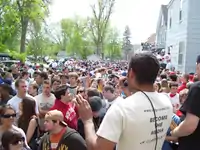Mifflin Street Block Party
The Mifflin Street Block Party is an annual celebration held on Mifflin Street in Madison, Wisconsin, United States, which is held on the last Saturday of April. It is one of two large parties held in Madison, the other being the Halloween party on State Street. The party has typically featured local and out-of-state musical acts playing on house porches, balconies and backyard stages. The party has not had city sponsorship since 2012. Efforts by the university and the city to create competing events have been unsuccessful.[1][2]
History
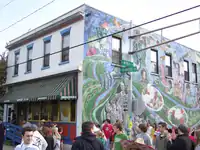
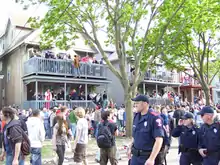
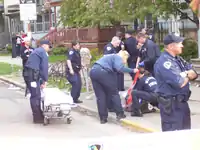
The Mifflin Street Block Party began in 1969 as a street protest, which involved dancing in protest against the Vietnam War. Its original date, May 3, was set to coincide with the one-year anniversary of the French student rebellion. Anti-war sentiments had accelerated in Madison since the 1967 Dow Chemical protest in which thousands of students occupied and were violently expelled from Ingraham Hall.[3] The original event arose as part of a continuing conflict between students and police in the "Miffland" area, centered on Mifflin Street. Police refused to allow permission for the street dance and when they entered the area in response to a noise complaint, a confrontation ensued that lasted three nights and spread into the surrounding student areas. Students threw stones at the police and constructed barricades to defend themselves. The police responded with tear gas and billy clubs.[4] At the end, 70 people were injured and more than 100 arrested, including future mayor, Paul Soglin.[5]
The event continued annually for the duration of the war, even though the traumatic effects of the nearby Sterling Hall bombing had a dampening effect on Madison anti-war efforts.[6] In an attempt to control the event, the city created "Mifflin on the Mall" in 1979 with music and concessions on State Street Mall. By 1982, however, students had once again taken to Mifflin Street.[5] Under sponsorship from the Mifflin Co-op, the block party was often used as a community fundraiser for various political or social causes. The co-op dropped its greater involvement in 1991 after the city requested that organizers keep alcohol within fenced-in beer gardens.[5]
By 1990, police had decided to not have any officers patrol the event and removed any official presence from the party. Despite crowds in excess of 10,000 no major problems occurred until a riot in 1996. Following this event, the city and police took more control in planning. They now effectively dictate the terms of the party, spending in excess of $80,000 on policing.
On May 4, 1996, a riot broke out, when a crowd of several thousand people threw bottles at a fire truck that had come to put out a bonfire started by the crowd to combat the cold weather. Police used riot gear to retake the block. The riots resulted in thousands of dollars of damage. The 1997 event was planned very carefully, but attracted few people due to poor weather. No major riots have occurred since 1996.[4]
In 2009 the city allowed local promotional group DCNY Pro to officially sponsor the event.[7] This would be the first time in over a decade the city had allowed a sponsor.[8] With support from WSUM radio station they produced one live music stage at the intersection of Bassett and Mifflin street. This year attendance grew to 15,000 but arrests declined to 164.[9] "Authorities credit official sponsors with the decrease in incidents. DCNY productions brought in a music stage, security staff, and food vendors."[10]
The following year of 2010, DCNY Pro once again sponsored the event partnering with WSUM Radio and Maximum Ink to produce two stages, one DJ stage at Bassett and Mifflin street and another Live music stage at Bedford and Mifflin street. This year the city also granted the sponsors a small beer garden in a parking lot on the 400 block of Mifflin street.[11]
In 2011 the Cieslewicz Administration agreed to allow open alcoholic beverages in the street for individuals of legal drinking age if they have a wristband. In previous years the police had noted that their most difficult areas to control were backyards, so this change in rules is an attempt to draw people into the streets and allow greater control by police officers. Also new to the event in 2011, The Majestic Theater, a local music venue, officially sponsored and hosted the event attempting to a put greater emphasis on music. MPD officers reported the crowd size, and the number of very intoxicated people was far greater in 2011 than recent Mifflin Street Block Parties due to the change in open intoxicants rules which resulted in more underaged drinking arrests and detox conveyances by noon than were usually tallied by the end of the party.. Preliminary numbers released showed 160 people were arrested, two people were stabbed, and multiple police officers were injured during the 2011 event.[12]
Controversy surrounded the 2012 Mifflin Street Block Party which occurred on May 5, 2012. Montee Ball, a Heisman award candidate was cited for Trespassing. Patrick Kane, a star forward for the Chicago Blackhawks, reportedly choked a woman at a house party and made anti-semitic slurs at another altercation. Photos surfaced of him partying with women on Mifflin, yelling at Madison Police officers, and passed out at a local bar. The party coincided with Cinco de Mayo celebrations throughout the country. This resulted in the event drawing the condemnation of University of Wisconsin-Madison Dean of Students Lori Berquam.[13]
After months of speculation regarding the annual block party, the City of Madison released a statement officially cancelling the block party on April 12, 2013. In a release, they indicated the severe punishments that the police department will be enforcing if there are violations as well as other important information. The release also mentioned Revelry, a student-created music festival that will be held the same day as an alternative to having house parties.[14] However, three days after the apparent cancellation of the party, the City of Madison announced that it had not in fact cancelled the annual gathering, blaming the confusion on poor wording of the previously released statement.[15]
However, to contrast years past events at the block party, in 2018 the event was reportedly calmer and more orderly. There were anywhere from 15,000 to 18,000 attendees, more than 2016 and 2017 combined.[16]
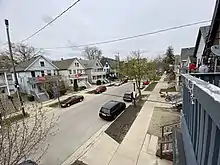
In 2020, the Mifflin Street Block Party was cancelled due to the Coronavirus pandemic.[17] Police were seen patrolling the streets throughout the day. At one point, houses that were playing music that was audible from the street were given a police warning to turn it off, or else they would be in violation of a new city ordinance.[18] The street was historically quiet for the day.[19]
Date change
The block party occurred on the first Saturday of May every year until 2005, when University of Wisconsin–Madison students lobbied to have the date changed to the last Saturday in April to avoid conflicts with finals. Mayor Dave Cieslewicz refused the date change at first, citing the additional cost and strain it would place on the city's police force. After students vowed to throw a large celebration both weekends, the mayor agreed to move the date of the block party with a promise from student leaders that they would discourage celebrations in the first week in May.[20][21] However, the mayor requested that the Associated Students of Madison pay for the additional costs of moving the date. The 2005 event was considered one of the calmest on record, with 225 arrests and 317 citations,[20][22] including the arrest of the University of Wisconsin football team's running back, Booker Stanley.[23] The block party was scheduled for Saturday, April 29 by city officials in 2006.[24] The 2007 party marked a move back to the traditional first Saturday of May and the 2008 party was scheduled for Saturday, 3 May 2008. The 2009 block party occurred on May 2. The 2010 block party happened on May 1. The 2011 party was on April 30, and the 2012 party was on May 5.
Police control
Between 1998 and 2002, attendance ranged from several hundred to a couple thousand.[5] In 2002, however, an unexpected 20,000 people showed up for the event. That same year, a riot during Madison's Halloween festivities prompted police to begin systematically clamping down on the Mifflin event.[25] The city has consistently refused proposals by students to close the street and revive the block party under student control.[5] A Madison police lieutenant was quoted as saying, "Quite frankly, we wish this event would go away."[5] Since 2002, there have been an increased number of arrests and a decrease in attendance.[26] The majority of arrests are for alcohol-related incidents.
Police have dealt with the event by heavily enforcing a number of ordinances. This has included the banning of glass containers on Mifflin, the limiting of the number of kegs that a house party can have, and the creation of a processing center for dealing with those arrested.[5] Police are also notorious for handing out open container citations and targeting especially loud and raucous house parties. In 2004, one house received $25,000 in fines for "selling alcohol without a permit."[5] In 2005, police arrested 225 people and issued 317 citations. The cost to the city was $100,600 and issued $85,000 in fines, most of which was dismissed or reduced.[5]

The Madison Police Department reported 60 arrests in 2018, and most offenses were for consuming alcohol in the street, public urination, or carrying glass containers.[27]
References
- "Mifflin Street Block Party sees spike in attendance despite rainy weather". The Daily Cardinal.
- "Students react to Mifflin Street 2014 event". The Daily Cardinal. May 4, 2014.
- "Two Days In October". PBS. Retrieved 2008-04-27.
- Costello, Megan (2005-04-28). "History of the Mifflin Street Block Party" (Newspaper article). The Badger Herald. Retrieved 2007-02-13.
- DeFour, Matthew (2008-05-01). "Mifflin Street Block Party Still Wild at 40" (Newspaper article). Wisconsin State Journal. Retrieved 2008-05-01.
- Durhams, Sharif & Maller, Peter (August 19, 2000). "30 years ago, bomb shattered UW campus". Milwaukee Journal Sentinel. Archived from the original (Online article) on March 11, 2007. Retrieved February 17, 2007.
- KITTNER, DEBORAH ZIFF and GENA. "MIFFLIN STREET PARTY GETS A SPONSOR". madison.com. Retrieved 2017-03-22.
- timeline. "Mifflin Block Party Evolution". www.tiki-toki.com. Retrieved 2017-03-22.
- "The History of The Mifflin Street Block Party timeline". Timetoast. Retrieved 2017-03-22.
- NBC15. "Fewer Problems at 2009 Mifflin Street Block Party". Retrieved 2017-03-22.
- "A history of Mifflin from 1969 to 2010". The Badger Herald. Retrieved 2017-03-22.
- "UPDATE: 2 Reported Stabbings on Mifflin Street". www.nbc15.com.
- Allen, Jackie. "Berquam revamps message to campus, urges smart choices".
- Johnson, Allie. "City makes it official in the fine print: No more Mifflin".
- Times, Steven Elbow | The Capital. "City on Mifflin party: We're not canceling anything". madison.com.
- Schorr, Parker. "Warm weather bring 15,000 partiers out for Mifflin Street Block Party". The Badger Herald.
- "Mifflin Street Block Party cancelled, students still plan to safely celebrate at home". The Daily Cardinal. Retrieved 2020-04-25.
- Cestkowski, J. T. (2020-04-22). "Madison police take hard stance against Mifflin Street Block Party, threaten citations". WKOW. Retrieved 2020-04-25.
- Danbeck, Jackson. "It's a no-show at this year's Mifflin St. Block Party". www.nbc15.com. Retrieved 2020-04-25.
- "Relative calm marks annual Wisconsin block party" (Newspaper article). USA Today. 2005-05-01. Retrieved 2007-02-13.
- Bettis, Angela (2005-02-24). "Students Want Mifflin Street Block Party Date Changed". WISC-TV Channel 3000. Archived from the original (News update) on 2007-08-18. Retrieved 2007-02-16.
- Andrus, Aubre (2005-05-02). "Date change proves successful for Mifflin Street Block Party" (Newspaper article). The Badger Herald. Retrieved 2007-02-16.
- "225 Arrests Reported At Mifflin Street Block Party". WISC-TV Channel 3000. 2005-05-02. Archived from the original (News update) on 2007-02-04. Retrieved 2007-02-16.
- Quitos, Heather (2006-04-12). "City gears up for April 29 block party" (Newspaper article). The Badger Herald. Retrieved 2007-02-17.
- "40 years on Mifflin street" (PDF). madison.com. Wisconsin State Journal. Retrieved 2008-05-01.
- Oliveira Jr., Pedro (2008-05-05). "Mifflin Arrests Hit All-Time High, Again" (Newspaper article). The Badger Herald. Retrieved 2008-05-06.
- Schorr, Parker. "Warm weather bring 15,000 partiers out for Mifflin Street Block Party".
